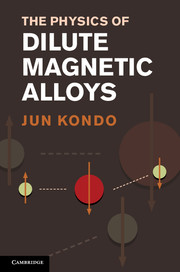5 - Magnetic impurities in metals
Published online by Cambridge University Press: 05 March 2013
Summary
In this chapter, we discuss the electronic states of a single impurity atom in metals. In particular, when the impurity atom is a 3d transition metal, its 3d orbital tends to assume the character of an isolated atom, and has a non-zero spin due to a similar mechanism to Hund's rule in atoms. We first describe the Friedel-Anderson theory regarding the emergence of this localized spin.
In alloys with a small amount of 3d transition metals, we have a long-standing problem which is known as the resistance minimum phenomenon. This is the phenomenon that the electrical resistance starts to rise as the temperature falls to around the boiling point of helium. We explain that this phenomenon is due to the exchange interaction between a localized spin and conduction electrons. This result suggests that we need to refine our discussion of the emergence of localized spin further, and many theoretical studies have been done. These theoretical works will be discussed later in Chapters 6 to 8. In this chapter, we compare the speed of the fluctuation of localized spin against the timescale of observation. We emphasize that when the latter is greater than the former, localized spin appears to vanish.
Local charge neutrality
In the discussion of the electronic states of an impurity atom in metals, the overall electric charge neutrality becomes an important issue. The potential due to a single impurity needs to fall to zero sufficiently fast as the distance r from the impurity becomes large.
- Type
- Chapter
- Information
- The Physics of Dilute Magnetic Alloys , pp. 69 - 119Publisher: Cambridge University PressPrint publication year: 2012



